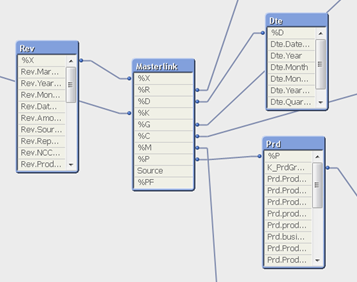Unlock a world of possibilities! Login now and discover the exclusive benefits awaiting you.
- Qlik Community
- :
- All Forums
- :
- QlikView App Dev
- :
- Set analysis explanations
- Subscribe to RSS Feed
- Mark Topic as New
- Mark Topic as Read
- Float this Topic for Current User
- Bookmark
- Subscribe
- Mute
- Printer Friendly Page
- Mark as New
- Bookmark
- Subscribe
- Mute
- Subscribe to RSS Feed
- Permalink
- Report Inappropriate Content
Set analysis explanations
Hi guys,
I need some clues about set analysis. Something i must have forgotten
1.

this is the result of a year and 2 months selection using set analysis
Sum ({<Dte.YearMonth={$(=max(Dte.YearMonth))}>} Rev.[Amount])
according to this model

2. I'd like to understand I can't use this
Sum ({<Dte.YearMonth={$(<=max(Dte.YearMonth))}>} [Rev.Amount]) (note <=) to have a YTD result with 1 year and 1 month selected?
The following set works with RevYear and Rev.month
sum ({<[Rev.Year]={'$(vMaxYear)'}, [Rev.Month]={'<=$(vMaxMonthNum)'}, Dte.Year=, Dte.Month=>} [Rev..Amount])
But why not with Dte.Year and Dte.month
Thnak you
Chris
Accepted Solutions
- Mark as New
- Bookmark
- Subscribe
- Mute
- Subscribe to RSS Feed
- Permalink
- Report Inappropriate Content
try this one :
Sum ({<Dte.YearMonth={'<=$(=max(Dte.YearMonth))'}>} [Rev.Amount])
Dirk
- Mark as New
- Bookmark
- Subscribe
- Mute
- Subscribe to RSS Feed
- Permalink
- Report Inappropriate Content
try this one :
Sum ({<Dte.YearMonth={'<=$(=max(Dte.YearMonth))'}>} [Rev.Amount])
Dirk
- Mark as New
- Bookmark
- Subscribe
- Mute
- Subscribe to RSS Feed
- Permalink
- Report Inappropriate Content
You´re misplacing the <=
The correct would be
Sum ({<Dte.YearMonth={<=$(=max(Dte.YearMonth))}>} [Rev.Amount])
- Mark as New
- Bookmark
- Subscribe
- Mute
- Subscribe to RSS Feed
- Permalink
- Report Inappropriate Content
Be careful that Max() return a not formatted number, so you should format it too
Sum ({<Dte.YearMonth={<=$(=date(max(Dte.YearMonth),'MM/DD/YYYY'))}>} [Rev.Amount])
- Mark as New
- Bookmark
- Subscribe
- Mute
- Subscribe to RSS Feed
- Permalink
- Report Inappropriate Content
Hi Guys
thank you for your answers.
Jus a metter of a very little '=' sign
have a nice day
Chris